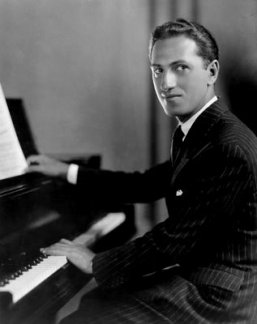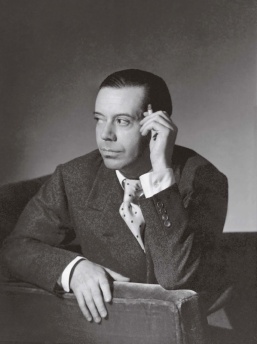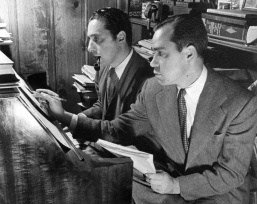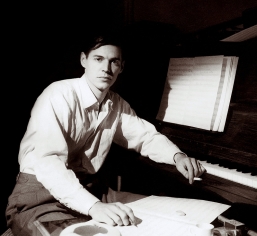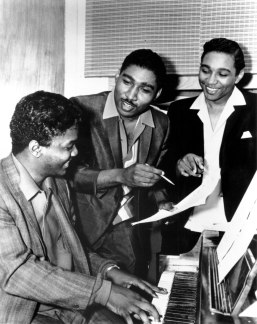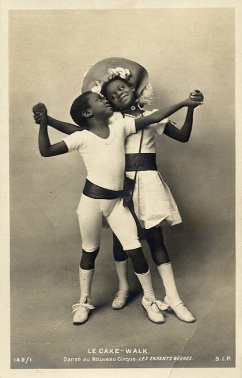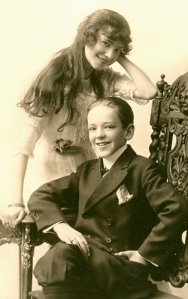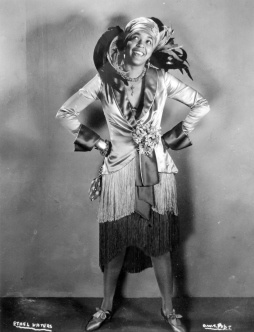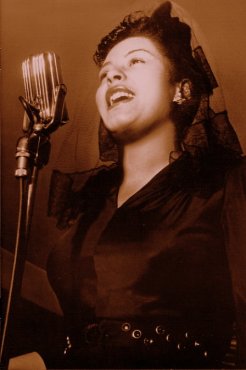Blues in the Night
________________________
Blues in the Night (m. Harold Arlen, w. Johnny Mercer)
Excerpt from WICN’s Song of the Week feature:
 The film chronicled the adventures of a struggling jazz quintet that criss-crossed the country riding the rails in boxcars and looking for its first big break. Warner Brothers assigned Harold Arlen and Johnny Mercer to create the soundtrack for the film. At one point in the film the band members ended up in jail and Arlen and Mercer were told to compose a blues song that would be sung in a jail cell. For two days Arlen analyzed recordings of blues songs and composed a melody, to which Mercer quickly devised lyrics that covered four pages. This was Mercer’s usual way of writing lyrics; the melody would be written first and he would add the words. Arlen thought that the lyrics were very strong beginning with the second stanza, but that the first stanza was weak. Although he rarely offered any suggestions to Mercer for changes in his lyrics, he did recommend that a line that appeared later in the song, “My mama done tol’ me…”, be moved to the beginning. Mercer made the change and the song “Blues in the Night” was born.
The film chronicled the adventures of a struggling jazz quintet that criss-crossed the country riding the rails in boxcars and looking for its first big break. Warner Brothers assigned Harold Arlen and Johnny Mercer to create the soundtrack for the film. At one point in the film the band members ended up in jail and Arlen and Mercer were told to compose a blues song that would be sung in a jail cell. For two days Arlen analyzed recordings of blues songs and composed a melody, to which Mercer quickly devised lyrics that covered four pages. This was Mercer’s usual way of writing lyrics; the melody would be written first and he would add the words. Arlen thought that the lyrics were very strong beginning with the second stanza, but that the first stanza was weak. Although he rarely offered any suggestions to Mercer for changes in his lyrics, he did recommend that a line that appeared later in the song, “My mama done tol’ me…”, be moved to the beginning. Mercer made the change and the song “Blues in the Night” was born.
From an article titled Come Rain or Come Shine: The Bittersweet Life of Harold Arlen, by John Lahr, 25 September 2005, pp. 92-93. Lahr relates part of a story that Arlen told Alec Wilder:
Like many of Arlen’s melodies, “Blues in the Night” departed from the thirty-two-bar Tin Pan Alley formula. It was fifty-eight bars long: a typical “Arlen tapeworm,” as he called it. Other “winding songs” by Arlen include “That Ole Black Magic” (seventy-two bars), “The Man That Got Away” (sixty-two bars), and “Ill Wind” (forty bars). “When Mercer wrote ‘Blues in the Night,’ I went over his lyric and I started to hum it over at his desk,” Arlen told Alec Wilder. “It sounded marvellous once I got to the second stanza but that first twelve was weak tea. On the third or fourth page of his work sheets I saw some lines—one of them was ‘My momma done tol’ me, when I was in knee pants.’ I said, ‘Why don’t you try that?’ It was one of the very few times I’ve ever suggested anything like that to John.”
When they finished, Mercer called his friend the singer Margaret Whiting, who’d had hits with “That Ole Black Magic” and “Come Rain or Come Shine,” and asked if he and Arlen could come over right away. Whiting suggested that they wait until later that evening, around ten, because she had guests for dinner. “Who’s there?” Mercer said. Whiting’s guest list included Mickey Rooney, Judy Garland, Mel Tormé, and Martha Raye. “My God, we’re coming right over,” Mercer said. As Whiting recalls, “They came in the back door, sat down at the piano, and played the score of ‘Blues in the Night.’ I remember forever the reaction. Mel got up and said, ‘I can’t believe it.’ Martha couldn’t say a word. Mickey Rooney said, ‘That’s the greatest thing I’ve ever heard.’ Judy Garland said, ‘Play it again.’ ” Whiting continues, “We had them play it seven times. Judy and I ran to the piano to see who was gonna learn it first. It was a lovely night.”
________________________
William Gillespie and chorus of jailmates in the film Blues in the Night (1941). Aside from this brief performance, the song is also played during the opening credits, played and sung during a montage, reprised often by Richard Whorf at the piano (dubbed by Stan Wrightman), and used often as thematic background music.
There is a defect, a persistent flapping noise, for the initial 50 seconds.
.
Woody Herman and his Orchestra, vocal Woody Herman – recorded on 10 September 1941, and released on the 78 rpm single Decca 4030 as the B-side of “This Time the Dream’s on Me”
.
Cab Calloway and his Orchestra, vocals: Calloway and the Palmer Brothers — recorded on 10 September 1941 (same date as the Woody Herman recording above)
.
Jimmie Lunceford and his Orchestra — recorded on 22 December 1941 in two parts, released by Decca Records as catalog number 4125A & 4125B
.
Benny Goodman and his Sextet, vocals: Peggy Lee and Lou McGarity — recorded on 24 December 1941
.
Harry James and his Orchestra — recorded on 30 December 1941, and issued as the B-side of “All for Love,” Columbia 36500
.
Bing Crosby with John Scott Trotter and his Orchestra — recorded 7 January 1942, issued on Decca 4183, b/w “Miss You”
.
Johnny Mercer and the Pied Pipers, featuring Jo Stafford — 1943
.
Ella Mae Morse, Johnny Mercer, and The Pied Pipers — Command Performance radio broadcast, 9 September 1943
.
Rosemary Clooney with Percy Faith and his Orchestra & chorus — 78 rpm single Columbia 39813, b/w Who Kissed Me Last Night (Stephen Weiss), released in 11 August 1952
.
.
Frank Sinatra — recorded on 24 June 1958; arranged by Nelson Riddle, and released on the album Frank Sinatra Sings for Only the Lonely
.
Doris Day — from her 1958 album Hooray for Hollywood
.
Harold Arlen — from the 1966 album Harold Sings Arlen (with Friend), (US) CBS Masterworks OS 2920 (Stereo)
.



















